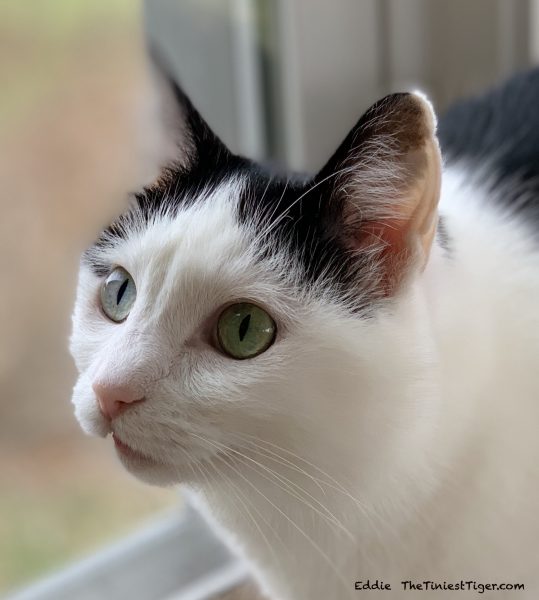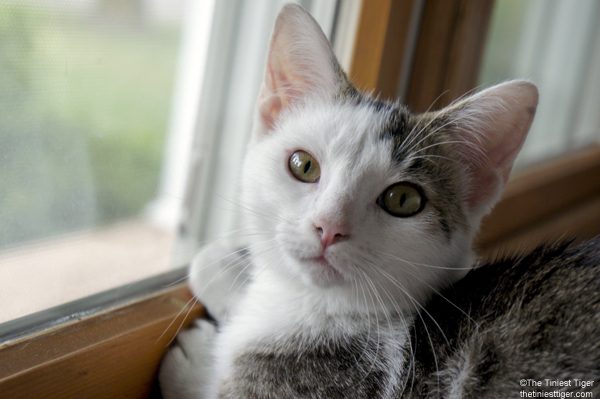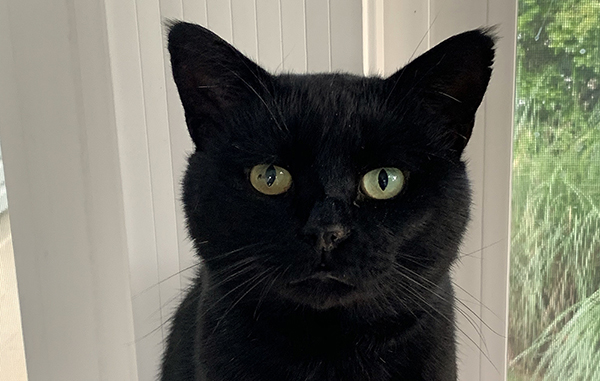
Dry Cat Nose?
I don’t know how many times each day Paul and I check on Annie, Eddie and Bob. Each time we touch their cute little noses. And who doesn’t love the nose boop when you feel a cold wet cat nose tap up against yours?
However, there might be times when their noses feels warm and dry instead. Does this indicate a potential fever or illness? Let’s talk about the various reasons behind a dry cat’s nose and insights into some facts about cat noses.
It’s important to keep in mind that a dry cat nose does not necessarily imply a health issue. Several factors impact the moistness and temperature of a cat’s nose. By understanding these factors and knowing when to be concerned, you can ensure your feline companion’s well-being and nose health.
Key Takeaways
- A dry cat nose is not always a sign of illness, as numerous factors can affect nose moistness and temperature.
- Understanding the reasons for a dry cat nose will help cat parents differentiate between normal and worrisome situations.
- Being aware of fun facts and proper care techniques can contribute to your cat’s overall nose health.
Reason for Dry Cat Noses
A dry cat nose can be attributed to various factors, and it does not necessarily indicate illness or fever. Here are some possible reasons for a cat’s dry nose:
- Exposure to warmth: Cats often prefer to rest in warm places like sunlit windows or near radiators, resulting in a temporary drying of their nose.
- Individual cat differences: Some healthy cats naturally have drier noses compared to others.
- Nose licking habits: Cats tend to clean their noses by licking. This behavior may remove the nose’s natural moisture, causing it to feel dry.
- Dehydration: Cats may not drink sufficient water during the day, leading to mild dehydration.
To prevent dehydration, ensure that your cat has access to ample fresh water. If your cat is uninterested in still water, consider providing a pet fountain. Including canned cat food in their diet is another method to increase their fluid intake, as it contains a higher moisture percentage than dry kibble.
When Is a Dry Cat Nose a Cause for Concern?

Sun-Affected Feline Noses
A dry cat nose itself might not be a serious issue, but if you observe additional symptoms like loss of appetite, lethargy, vomiting, diarrhea, sneezing, watery eyes, or colorful nasal discharge, it could indicate a potential health problem, such as an upper respiratory infection (URI). In such cases, consult your veterinarian for advice and possible medication to ease your cat’s discomfort.
Sunburned Cat Noses
Cats, especially those with white fur and pink noses, like our Annie, are susceptible to sunburn on their hairless noses. This can lead to dryness, swelling, redness, and flaky skin. To protect cats that love basking in the sun or have light-colored coats, consider the following precautions:
- Draw the blinds or curtains to block excessive sunlight from windows.
- Restrict your cat’s access to sunlit rooms during peak sun hours.
- Apply a small amount of cat-safe sunscreen to their nose, as recommended by your veterinarian, who can also guide you on the appropriate frequency and amount of sunscreen to use.
Avoid using human sunscreen products on your cat, as they may cause skin irritation and sickness if ingested by your cat when licking its nose.
Why Are Cats’ Noses Wet?
A wet cat nose is often due to a combination of sweat and tear duct drainage. Since cats don’t sweat as humans do, their noses play a crucial role in regulating their body temperature. Apart from their noses, cats also perspire through their paw pads, which might leave damp footprints on hot days.
A wet cat nose provides them with an enhanced sense of smell by trapping scent particles, enabling them to efficiently detect various odors. This moisture on their nose serves as a vital tool for grooming, air circulation, and overall olfactory prowess, contributing to their exceptional sniffing abilities.
Fun Facts About Cat Noses

The Unique Flehmen Response
Cats possess around 200 million scent receptors, providing them with an extraordinary sense of smell. This ability assists them in locating and tracking prey, determining food safety, and sensing other cats in their vicinity that may be marking territory or in heat. Below are some entertaining facts regarding cat noses:
- Every cat nose displays a distinct pattern of bumps and ridges, making each one as unique as fingerprints and snowflakes.
- Since cats possess fewer taste receptors than humans, their sense of smell plays a significant role in stimulating their appetite. As a result, many cats lose their appetite when experiencing nasal congestion.
- Some cats can be overwhelmed by various scents, including products like scented litter, air fresheners, or laundry detergents. In these cases, opt for unscented items to prevent distress.
- Cats may lick their noses to reset their sense of smell or clean off trapped scent particles. Additionally, this action can indicate anxiety.
- When greeting each other, cats often indulge in mutual sniffing that can span from nose to tail. That’s why cats often approach and sniff your finger when it’s extended to them—it serves as a substitute nose.
- Orange-colored cats, like calicos or tortoiseshells, often develop freckles on their noses. These harmless freckles are a result of a condition known as lentigo.
- Your cat’s nose contains numerous small blood vessels that can expand or contract based on their emotional state. For example, when they’re excited, their nose may become brighter and more vibrant.
The Flehmen Response
Your cat’s sense of smell is further amplified by an intriguing behavior called the flehmen response. Have you ever noticed your cat make an odd, open-mouthed grimace? That’s the flehmen response in action. It occurs when your cat encounters a highly stimulating scent, such as catnip or pheromones, the hormones responsible for attracting cats to one another.
During this response, your cat inhales air into its mouth, passing it over fluid-filled sacs situated on the roof of the mouth. These sacs are directly connected to the nasal cavity, allowing your cat to experience a deeper, more intense smell. Some even refer to this action as “smell tasting.”
How to Care for Your Cat’s Nose
Your cat’s nose is mainly self-cleaned during grooming. However, gently wipe away debris or discharge with a soft cloth when needed. Remember to be cautious and ensure your cat’s comfort during the process.
Common Cat Nose Ailments
Cats may experience nasal issues such as stuffy or runny noses, which could indicate an upper respiratory infection or another illness. Allergies and scratches sustained during accidents or encounters with other animals are also prevalent nose problems. Additionally, growths can be present, but they might be difficult to detect if situated inside the nasal cavity.
It is essential to remember that not all growths are malignant, so there is no need for immediate alarm. However, it is crucial to consult a veterinarian promptly. Early detection of cancerous growths increases the chances of a favorable outcome for the cat. Even if the growth is benign, it might still require removal, especially if it causes discomfort or breathing difficulties.
If you are concerned about your cat’s nose or any other health concern, please consul with a veterinarian.
Frequently Asked Questions
Does a dry nose indicate sickness in cats?
A dry nose may or may not be a sign of illness in cats. A cat’s nose can temporarily become dry due to environmental factors or while sleeping. However, if the dry nose is accompanied by other symptoms, it could indicate a health issue.
Should I worry if my cat’s nose is dry and warm?
A dry and warm nose alone is not necessarily a cause for concern. It can be normal for a cat to have a dry nose during certain times of the day or when they are in a warm environment. Watch for other symptoms or behavioral changes to determine if your cat may be unwell.
How can I tell if a kitten with a dry nose is sick?
To determine if a kitten with a dry nose is unwell, look for additional signs of illness such as lethargy, loss of appetite, vomiting, diarrhea, or sneezing. It’s best to consult a veterinarian if you observe any concerning symptoms in your kitten.
Is it normal for sleeping cats or kittens to have a dry nose?
Yes, it is normal for cats or kittens to have a dry nose while they are sleeping or resting. Their nose may become moist again after waking up and becoming active.
Can a dry nose be linked to sneezing in cats?
A dry nose alone may not be related to sneezing in cats. However, if your cat is sneezing frequently or has nasal discharge, it could indicate an upper respiratory issue, allergies, or other health problems. It’s important to consult a veterinarian if you’re concerned about your cat’s sneezing and dry nose.
What are the signs of a fever in a cat?
Signs of a fever in cats may include a warm and dry nose, increased body temperature, lethargy, loss of appetite, shivering, and dehydration. If you suspect your cat has a fever, it’s important to seek veterinary advice for proper diagnosis and treatment.